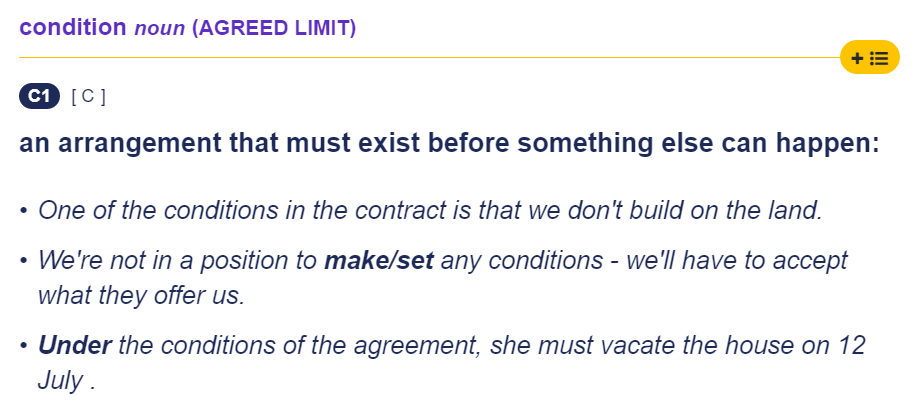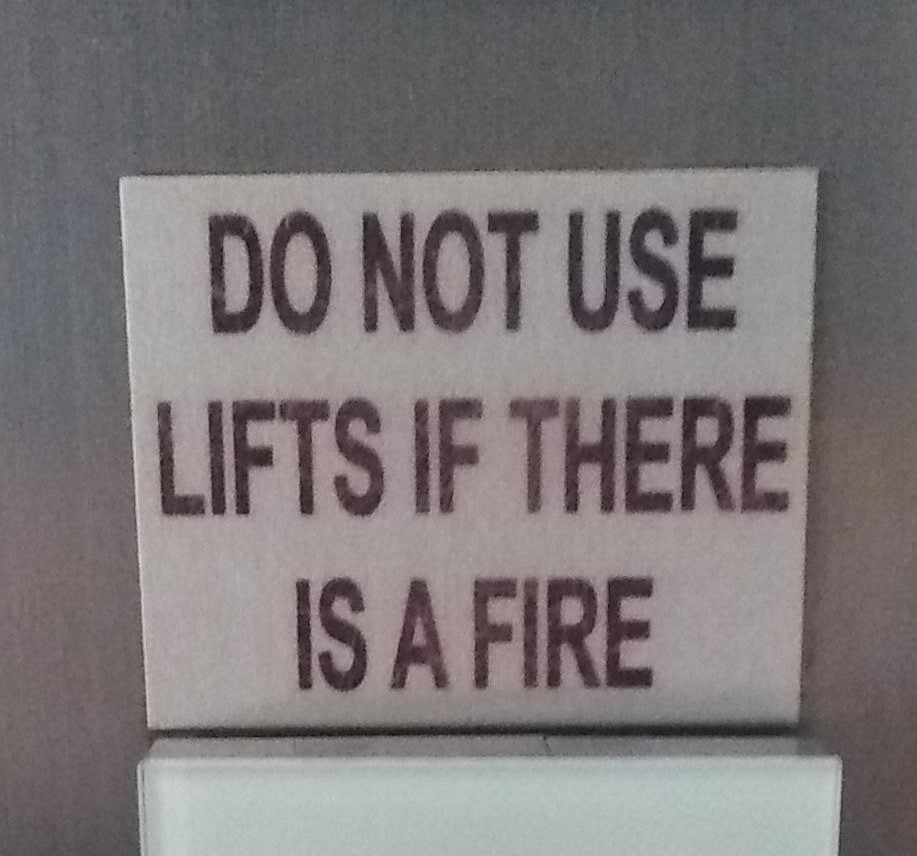# Conditionals (Type 0, 1, 2)
# The word "condition"
Before we study the examples of conditional sentences, it is a must to know the meaning of the word condition. In fact, the word condition has multiple meaning. The meaning we want to focus on is shown below,
Condition - (條件)
 From Cambridge Dictionary
From Cambridge Dictionary
# Real life examples
# Lift

# Check your understanding
Q1. Under what condition should we not use the lifts?
There is a fire.
# MTR

# Check your understanding
Q2. Under what condition does the MTR staff offer to help?
You feel unwell.
# Use the conditionals to show conditions
We use the conditionals (aka. conditional sentences) to show that something may happen under certain conditions.
Example 1
| If you freeze water, | it turns into ice. |
|---|---|
| The condition | The result of the condition |
Example 2
| If my friends does not celebrate my birthday, | I will be very sad. |
|---|---|
| The condition | The result of the condition |
# Main clause and if clause
Conditional sentences consist of two clauses - a main clause and an if clause. The main clause is the result that will/would happen under certain condition, while the if clause is characterised by the word if and it contains the condition of an event.
Example 1
| If you freeze water, | it turns into ice. |
|---|---|
If clause | Main clause |
Example 2
We can also start with a main clause. In this case, we omit the comma ,.
| He would come | if you called. |
|---|---|
Main clause | If clause |
Example 3
Apart from the conjunction if, we can use phrases such as in case of and unless.
| Break glass | in case of emergency. |
|---|---|
Main clause | If clause |
# On the types of conditionals
Read the story
It's 6am on Monday morning, and Margaret is getting ready for work. She has to hurry because if she is late for work, her boss will be angry.
We are going to learn how to use conditionals by observing the elements of the conditional sentence above. Please answer the questions below one by one.
Where is the conditional sentence? Read that out.
"... if she is late for work, her boss will be angry."
Hurray😋! You are now able to spot the conditional sentence within a text.
What is the if clause in the above conditional sentence?
"if she is late for work"
Good Job😋! You managed to recognise an if clause.
What tense has been used for the verb in the if clause?
the verb is is in simple present tense.
What is the main clause in the above conditional sentence?
"her boss will be angry"
What tense has been used for the verb in the main-clause?
the verb will be is in simple future tense
The annoying and silly series of questions😵 above is actually a step-by-step guide to recognising the type of a conditional sentence.
Regrettably🌚, there are altogether four types of conditionals. Each of them has a unique function and some unique grammatical features.
Four Types of Conditionals
| Type | Function | If clause | Main clause |
|---|---|---|---|
| Type 0 | Facts which are always true | simple present | simple present |
| Type 1 | A likely situation in the future | simple present | simple future |
| Type 2 | An unlikely situation | simple past | would + verb |
different past |
We are only going to discuss type 0, type 1 and type 2 in S2. Hurray🎉! All you have to know for now is that the key to identifying the type of a conditional sentence is to look at the tenses of the if clause and the main clause. That it!
# Type 0 conditionals
It is very important that you can recite the functions and the grammatical features of each type of conditionals. Spend 1 minute to do it now😠.
| Type | Function | If clause | Main clause |
|---|---|---|---|
| Type 0 | Facts which are always true | simple present | simple present |
Examples of Type 0 Conditionals
- The program shuts down immediately if you press Alt + F4 on the keyboard.
- Ben gets dizzy and nauseous if he eats peanuts.
- If we heat up water to 100oC, it turns into steam.
- I always carry a gun with me if I leave home.
- What happens if you don't hand in homework on time?
- If you don't hand in homework on time, you get a late assignment record.
- Do not use lifts if there is a fire.
Computer programs, medical conditions, scientific facts, habits and rules are examples of facts which are always true (in general).
# Type 1 conditionals
Again, it is very important that you can recite the functions and the grammatical features of each type of conditionals. Spend 1 minute to do it now😠.
| Type | Function | If clause | Main clause |
|---|---|---|---|
| Type 1 | A likely situation in the future | simple present | simple future |
Examples of Type 1 Conditionals
- If I
seeSam next week, Iwill givehim a box of surgical mask. - I
will goto Japan if COVID-19isunder control in July. - If lessons
resumenormal too early, COVID-19may goout of control once again. - If you
eatthat much every day, youwill getreally fat. - If you
feelunwell on the train, our staffcan helpat the next station.
Future plans, predictions, suggestions and offers are examples of likely situations.
# Wait a minute!
Check out the main clauses of type 1
- If lessons
resumenormal too early, COVID-19may goout of control once again. - If you
feelunwell on the train, our staffcan helpat the next station.
In fact, we can use may and can to replace will in the main clauses of type 1 condition when we are less certain about the situation.